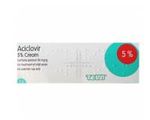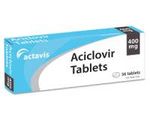Genital herpes is an STD caused by an infection with the herpes simplex virus. This venereal disease is presents itself in sores, blisters and itching on and around the genitals. Genital herpes is mainly spread through sexual contact. You can contract it, among other things, by having unsafe sex. The symptoms of genital herpes are easy to treat, however there is no complete cure for genital herpes so the virus itself always remains dormant in the body and can resurface over time.

Genital Herpes
Treatments
- All treatments
- Prescription medicines
- Non-prescription medicines
- Relevance
- Name A-Z
- Name Z-A
- Price low-high
- Price high-low
How does Dokteronline work?
At Dokteronline, you can get expert advice from doctors quickly, without the hassle of visiting your GP’s surgery. Take care of your health with reliable treatments and information from the comfort of your home.
Select your preferred treatment
The doctor will review your medical request
The pharmacy will ensure your medication is delivered to your doorstep
What is genital herpes?
Genital herpes is one of the most common sexually transmitted diseases. That's because many people carry the herpes virus.
The virus has different subtypes. Herpes simplex type 1 (HSV-1) is particularly well known: this virus usually causes cold sores. Herpes simplex type 2 (HSV-2) is very similar to type 1, but mainly causes herpes symptoms in the genitals.
Not everyone infected with the herpes virus actually develops cold sores or genital herpes. But even without symptoms, herpes is very contagious. This means you can get genital herpes from someone who is infected, but has no symptoms (yet). In this way, you can also pass the herpes virus on to someone else without noticing.
Genital herpes symptoms
Genital herpes causes obvious symptoms in some people. But an infection can also come without symptoms. If symptoms do occur, you will usually notice within a week of contracting an infection. Below is a list of the most common genital herpes symptoms:
General symptoms of genital herpes
- Blisters/sores on or around the mouth, anus and/or genitals. The blisters are filled with clear fluid and feel painful. Within about three weeks they will dry up or open. They then heal without leaving a scar;
- Red spots on the skin;
- Itching, pain and/or burning sensation, sometimes also when urinating or defecating;
- Generally feeling unwell;
- Fever;
- Muscle ache.
Genital herpes in men
Specific symptoms of genital herpes in men include:
- Blisters/sores on the outside of the penis.
Genital herpes in women
Specific symptoms of genital herpes in women include:
- Blisters/sores on the skin/mucous membranes of the labia, vagina and/or cervix;
- Vaginal discharge, sometimes with itching;
- Swollen glands in the groin;
- In the case of pregnancy from the 34th week (for a first-time infection): the virus can be transferred to the child during childbirth. This is rare, but the baby is at risk of infections of the skin, eyes or nervous system.
Even if genital herpes symptoms disappear, the virus remains in the body, so the blisters can return. This often happens when the immune system is temporarily weakened. For example, due to stress, fatigue or illness. But other factors, such as menstruation, can also activate the herpes virus.
The initial infection of genital herpes usually presents the most severe symptoms. With a subsequent flare-ups, the genital herpes symptoms are often somewhat milder and blisters will heal sooner.
Cause of genital herpes
The herpes simplex virus spreads during intimate physical contact of the genitals and through contact with the anus or mouth. So you can get genital herpes through vaginal sex, oral sex and anal sex. If the infected areas are touched with fingers or a sex toy, for example, the STD can also spread that way.
Please note: even someone who has cold sores can transmit the genital herpes virus. The other way around is also possible (you get a cold sore from contact with someone who has genital herpes).
Preventing genital herpes
To prevent genital herpes, safe sex is one of the most important measures you can take. However, a condom does not offer 100% protection against genital herpes. The virus can also spread through the skin and mouth. If you have symptoms, it is better to wait until all sores have completely disappeared before having sex. Then you can be sure not to spread the virus further.
Also pay close attention to hygiene; touch the blisters and/or scabs as little as possible, wash your hands often and do not share sex toys during sex.
Genital herpes test
The symptoms of genital herpes are similar to those of other conditions, such as cystitis or the STD syphilis. You can rule out infection with other STDs by having a general STD test done. In addition, a doctor will be able to determine whether or not you have genital herpes based on your symptoms. If there is any doubt, the doctor can perform a genital herpes test by taking some fluid from the blisters and having them examined in a laboratory.
If you do have genital herpes, you are more likely to have contracted another STD too. In that case, it is therefore wise to do a general STD test. You should also inform your partner(s) so that they can also be tested. This prevents the virus from spreading further.
Treating genital herpes: medications and creams for genital herpes
The symptoms of genital herpes usually disappear on their own. On average, this takes about 3 weeks. Treatment is possible if you suffer from genital herpes symptoms. Medication will not make the herpes virus disappear, but the symptoms will diminish quickly.
There are several medications for genital herpes treatment:
- Virus-inhibiting medication, such as aciclovir or valacyclovir. These medicines ensure that the virus eases faster, so that symptoms disappear sooner. Virus inhibitors are mainly used for an acute first infection with many symptoms;
- Pain-relieving medicines, such as paracetamol and ibuprofen. These drugs reduce genital herpes symptoms such as pain and itching;
- Local treatment, such as genital herpes creams. Zinc ointment is usually used for this. The active ingredient ensures that the blisters and sores dry up sooner.
Genital herpes treatment
Keep the following in mind during treatment for genital herpes,:
- Virus-inhibiting medicines can cause side effects in some cases. You may suffer from symptoms such as nausea, vomiting, abdominal pain, diarrhoea or headaches. Dizziness and skin rashes may also occur.
- Always read the information leaflet provided carefully before use. It contains important information about the use of the medicine, all possible side effects and other warnings;
- Virus inhibitors do not make you resistant to the herpes virus which is why safe sex remains very important;
- Consult a doctor if you continue to suffer from symptoms following treatment for genital herpes.
Prescribed medication to cure genital herpes
Many medications for genital herpes require a prescription. You can request a suitable course of treatment at Dokteronline. Your application will be assessed by a doctor based on the medical questionnaire you have completed. A written prescription will then be forwarded to a pharmacy, after which the prescribed medication will be discreetly delivered to your home.
Would you like more information about treatment for genital herpes? Feel free to consult a doctor or pharmacist.

